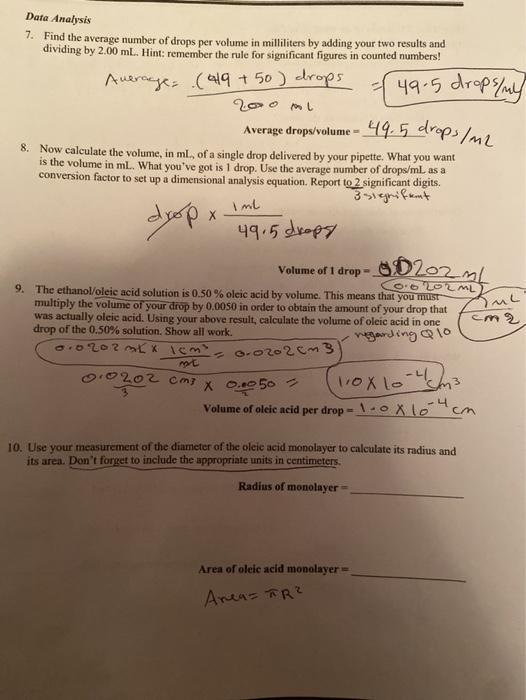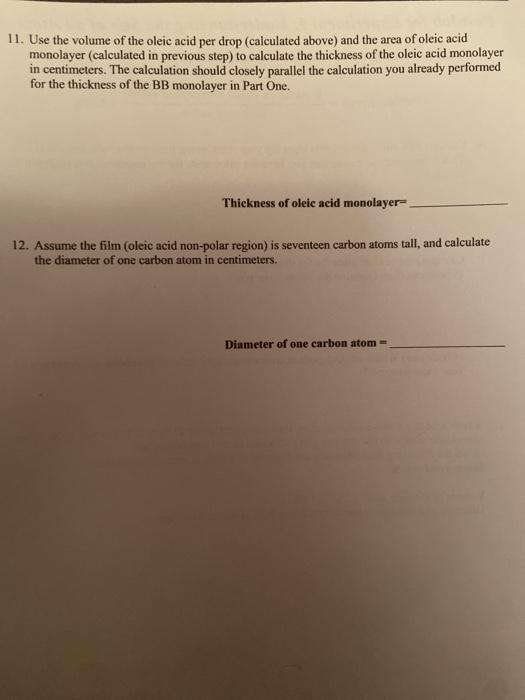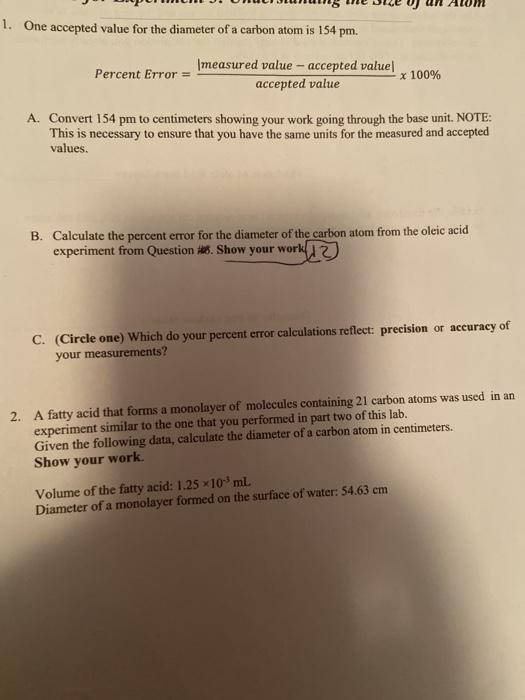Answered step by step
Verified Expert Solution
Question
1 Approved Answer
Data Analysis 7. Find the average number of drops per volume in milliliters by adding your two results and dividing by 2.00 ml. Hint:



Data Analysis 7. Find the average number of drops per volume in milliliters by adding your two results and dividing by 2.00 ml. Hint: remember the rule for significant figures in counted numbers! Average (419 +50) drops 200ml Average drops/volume - 49.5 drops/m2 8. Now calculate the volume, in ml., of a single drop delivered by your pipette. What you want is the volume in ml.. What you've got is 1 drop. Use the average number of drops/mL as a conversion factor to set up a dimensional analysis equation. Report to 2 significant digits. 3 signifunt IML drop x 49.5 drops 80202mL Volume of 1 drop-. 0.6202ML 9. The ethanol/oleic acid solution is 0.50 % oleic acid by volume. This means that you must multiply the volume of your drop by 0.0050 in order to obtain the amount of your drop that was actually oleic acid. Using your above result, calculate the volume of oleic acid in one drop of the 0.50% solution. Show all work. regarding Q10 = 0.0202 cm 3 0.02023L x 1cm mit 0.0202 Cm3 49-5 drops/my X 0.00 50 ? Volume of oleic acid per drop_ 110 x 10-4m3 1.0x104cm 10. Use your measurement of the diameter of the oleic acid monolayer to calculate its radius and its area. Don't forget to include the appropriate units in centimeters. Radius of monolayer Area of oleic acid monolayer= Area= FR Jul cm2 11. Use the volume of the oleic acid per drop (calculated above) and the area of oleic acid monolayer (calculated in previous step) to calculate the thickness of the oleic acid monolayer in centimeters. The calculation should closely parallel the calculation you already performed for the thickness of the BB monolayer in Part One. Thickness of oleic acid monolayer= 12. Assume the film (oleic acid non-polar region) is seventeen carbon atoms tall, and calculate the diameter of one carbon atom in centimeters. Diameter of one carbon atom- 1. One accepted value for the diameter of a carbon atom is 154 pm. Percent Error = Imeasured value - accepted value] accepted value A. Convert 154 pm to centimeters showing your work going through the base unit. NOTE: This is necessary to ensure that you have the same units for the measured and accepted values. B. Calculate the percent error for the diameter of the carbon atom from experiment from Question #. Show your work x 100% oleic acid C. (Circle one) Which do your percent error calculations reflect: precision or accuracy of your measurements? Volume of the fatty acid: 1.25 x10 ml. Diameter of a monolayer formed on the surface of water: 54.63 cm 2. A fatty acid that forms a monolayer of molecules containing 21 carbon atoms was used in an experiment similar to the one that you performed in part two of this lab. Given the following data, calculate the diameter of a carbon atom in centimeters. Show your work.
Step by Step Solution
★★★★★
3.43 Rating (150 Votes )
There are 3 Steps involved in it
Step: 1
7 Average Number of Drops per Volume Average 419 50 200mL 469 200dropsmL 2345dropsmL 8 Volume of a S...
Get Instant Access to Expert-Tailored Solutions
See step-by-step solutions with expert insights and AI powered tools for academic success
Step: 2

Step: 3

Ace Your Homework with AI
Get the answers you need in no time with our AI-driven, step-by-step assistance
Get Started


